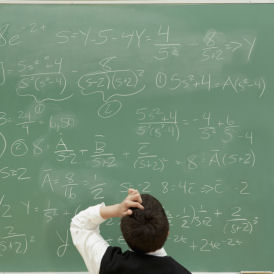Pupils ‘should study maths up to age 18’
Pupils in English schools should study maths up to the age of 18, says a new report commissioned by the Government and led by TV’s Carol Vorderman.

There needs to be a radical change to give children the mathematical skills needed to get on in the modern workplace, according to the report.
The report said the education system is currently failing young people, with almost half of 16-year-olds failing to get a grade C in maths GCSE and only 15 per cent then going on to study beyond that level. In most industrialised nations, this figure is closer to 100 per cent.
The report said that 24 per cent of economically active adults are “functionally innumerate” and lays the blame on the schools system.
As well as recommending that all pupils study maths in some form up the age of 18, the report also suggested the maths GCSE should be split into two exams, one of which focuses on basic numeracy and personal finance while the other is a preparation for A-level study. It also said there should be better teaching training, more encouragement, and a replacement for SATs for 11-year-olds.
Fractions - can you get it right?
The report includes one question given to the lower 50 per cent of Year 11 students just before they took their GCSEs after extensive revision for maths.
Less than half of them got it right. Can you do it? (No cheating).
What is ¼ + ½?
Click here for the answer or scroll down
Mathematics ‘critically important’
The review was led by Carol Vorderman, who is best known for co-hosting TV show Countdown.
She said: “Mathematics is a critically important subject. It is a language without which the entire global infrastructure is struck dumb.
Maths is a language without which the entire global infrastructure is struck dumb. Carol Vorderman
“This report does not make comfortable reading. It is aspirational but this does not mean making maths ‘harder’ for everyone; it means making the teaching better and what is taught much more suitable for those who are learning it.”
Education Secretary Michael Gove said: “As Carol and her team point out so powerfully, we are falling behind our competitors when it comes to mathematics education.
“British 15-year-olds’ mathematics skills are now more than two whole academic years behind 15-year-olds in Shanghai and the last decade has seen us plummet down the international league tables in both maths and science.
“This comprehensive report, looking at all the important areas, will be of great help as the Government continues its drive to equip our children with the skills that they need to compete with their global contemporaries and thrive in the 21st century.”
The answer is ¾.
A half equals two quarters, so two quarters plus a quarter equals three quarters.
53 per cent of students asked this question got it wrong. The most common incorrect answer was 2/6.